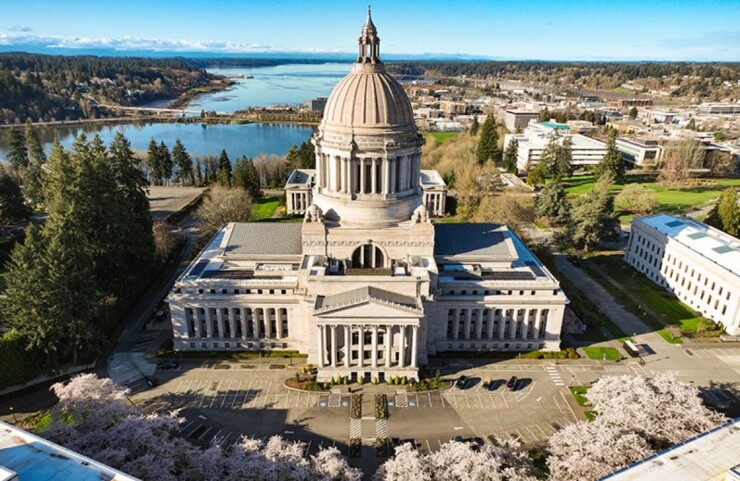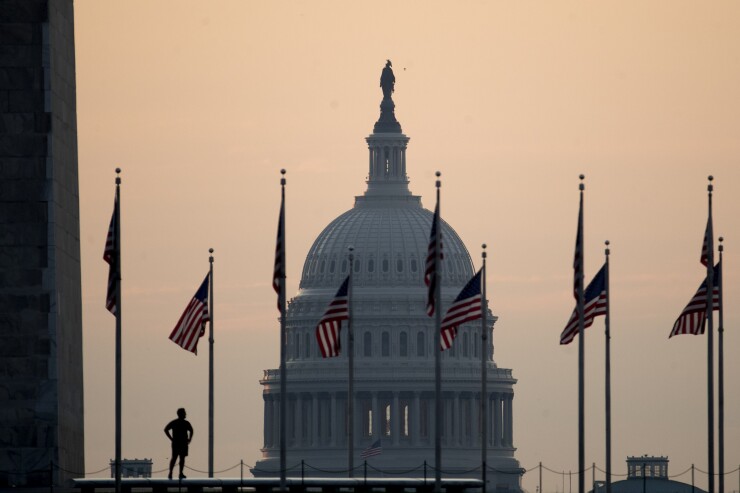Want unlimited access to top ideas and insights?
The
The outcome of the election will shape the tax impact for large corporations including insurance carriers, especially since the Tax Cuts and Jobs Act, enacted in 2018, expires in 2025. It included certain tax increases for the insurance industry, John Gimigliano, principal, tax, KPMG LLP said at the consultancy's annual insurance industry conference.
"A lot of people in the industry said, 'Why us, like nobody else, seemed to get picked on with specific tax increases that apply to a single industry?' It's a really interesting question," he said. "It's in some ways, a cautionary tale, that as we go into this exercise in 2025 where we're looking at the strong possibility of additional tax increases, you have to ask, are we going to get treated differently? And if so, why?"
The direction that
Another issue for insurers that could be affected by who wins power in the election is regulators' calls for data from insurers. The National Association of Insurance Commissioners (NAIC), the group of state insurance regulators,
Read more:
A new survey from Digital Insurance's parent company Arizent gives insight on insurance professionals' views for this election.
When asked which outcome for President would best benefit their company, 36% of the carriers and 52% of the agents and brokers believed a Republican outcome would be better for their companies in the long-term, while 50% of the carriers and 35% of the brokers believed a Democrat in the White House would be preferable.
For their views on the Senate, 43% of the carriers and 47% of the agents and brokers believed a Republican majority would be better, while 55% of the carriers and 37% of the agents and brokers said a Democratic majority would be more beneficial.
Survey respondents were also almost equally split on which type of House majority would be beneficial with 36% of carriers and 50% of agents and brokers preferring a Republican majority, while 55% of carriers and 32% of agents and brokers favoring a Democratic majority.
The survey also asked which of the candidates' policies were most important to the insurance industry and respondents identified: job growth, climate change and the
Read more:
Read more about how the election could impact the insurance industry.

N.C. rate increase hearings occurs during competitive insurance commissioner race
North Carolinians will most likely have to wait until after Election Day, and the outcome of their state's
"This is going to be a really important bellwether, in terms of voter sentiment, in terms of this divide between availability and affordability of coverage, and ensuring that carriers are present in the state and are able to make good on their obligations," Tim Zawacki, principal research analyst at S&P Global Market Intelligence told Digital Insurance's
The state's department of insurance (NCDOI) held hearings
Read more:

KPMG: Large insurers' tax burden depends on election results
Heading into the U.S. presidential and congressional elections is a mixed bag for large insurance companies, according to government and tax experts from KPMG, who spoke at the consultancy's recent annual insurance industry conference.
"People in their cities know oftentimes who their insurance agents are, and their auto insurers or their homeowners insurance are individuals in their communities that are putting their names and their businesses on softball teams' jerseys and showing up around the community," Libby Coffin, principal-in-charge, office of government affairs and public policy, KPMG LLP said at the conference. "There's a counterbalance there that they do view the industry as necessary and providing a very good service."
"On the other hand," she said, politicians are "always sensitive to costs that affect their voters, and there's a skepticism of any businesses that are viewed as big."
Coffin added that the best course for large insurers, that likely have their own government liaisons and engagement with members of Congress and local officials, is to cultivate those relationships regularly, so when there is an industry crisis, insurers "walk in the door with that credibility and have the ability to share facts that are supplementing what might be in the news."
Read more:

FHFA report could affect flood insurance compliance
The actions the Federal Housing Finance Agency agreed to come as a result of an inspector general audit, which found the FHFA's flood insurance oversight for the influential government-related mortgage investors was effective but not applied regularly enough and lacked some formal procedures.
The government watchdog's report could bring more constant scrutiny to the many depository and nonbank lenders and servicers that work with the enterprises because private mortgage firms ultimately are responsible for flood insurance compliance,
"Examination procedures were inconsistent for assessing enterprises' oversight of seller/servicers' compliance with flood insurance requirements," the Office of Inspector General said in a report on the FHFA's Department of Enterprise Regulation released Thursday.
Read more:

More candidates enter Washington state's insurance commissioner election
Patty Kuderer, a Democrat, was expected to be the only candidate in Washington state's insurance commissioner race, but several others filed to run during the state's May 6-10 filing period. The state's insurance commissioner race is non-partisan, so there were no primaries. As of July, the leading Republican challenging Kuderer is Phil Fortunato.
Kuderer and Fortunato have both been state senators since 2017. The current commissioner, Mike Kreidler, who has served in the role since 2001,
Read more:

Report notes political violence risk is biggest threat to US business owners
According to Beazley's
Beazley cites the
"History serves as a useful guide and can help our clients to identify whether they may fall victim to political violence this year. Previously, we have seen that businesses located close to government assets have been affected by rioting and political violence. While they are not the target of protestors' anger, they are often dragged in through collateral damage. For these businesses, having the right insurance is crucial to survival in the current geopolitical climate," said Lucy Straker, focus group leader of political violence and deadly weapons protection at Beazley, in the report.
Read more:





